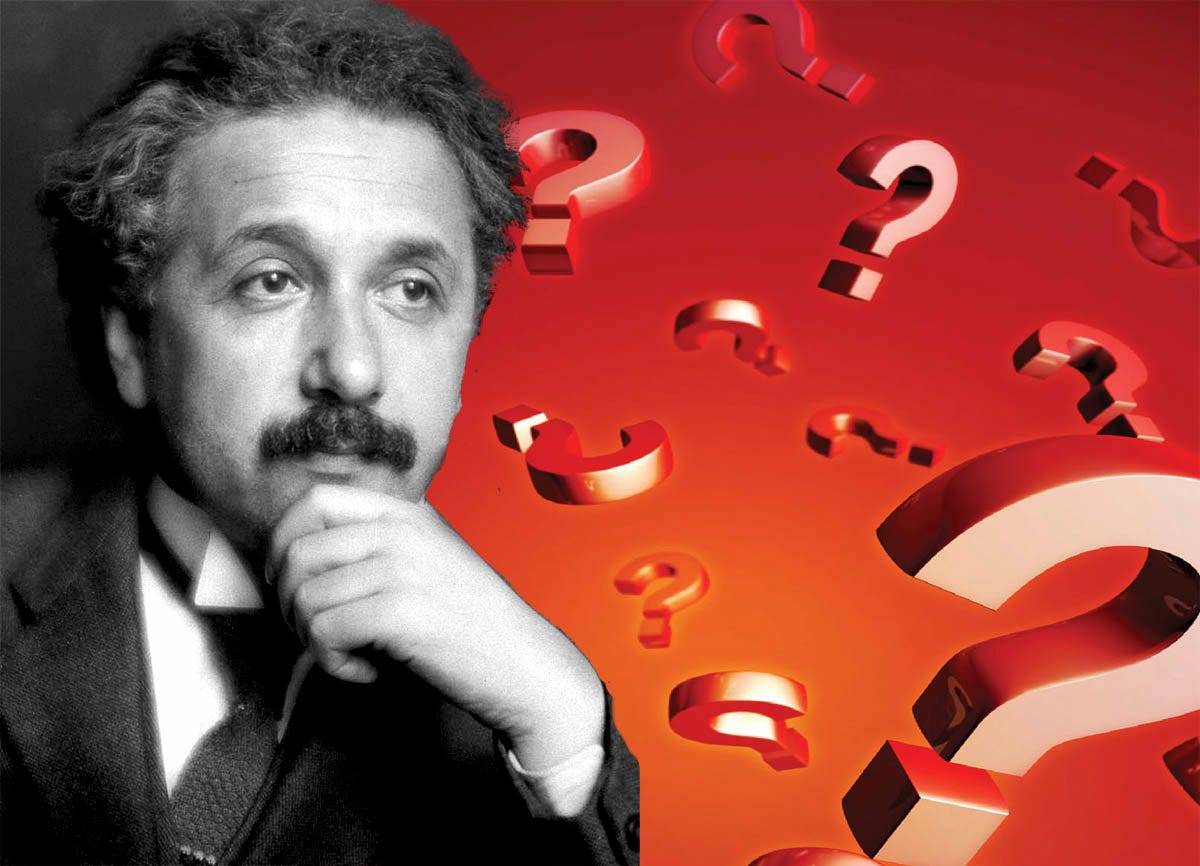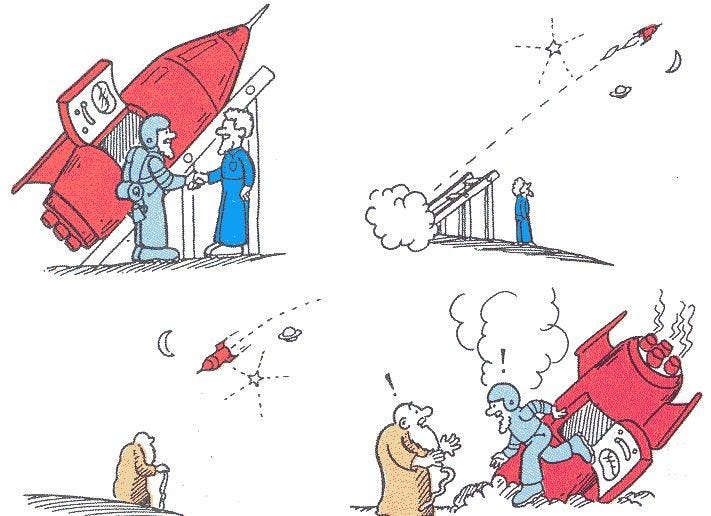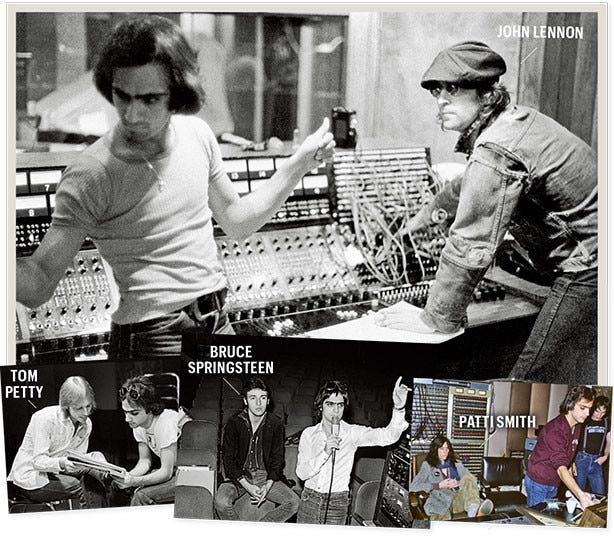Jimmy Iovine and Einstein's Theory of Relativity
Time slows the faster you move towards solving your customer's problem.
Once Upon a Pitch Problem #14
I published this article back in 2018 and today, I still receive notes of gratitude for sharing my learnings from working for Jimmy Iovine at Beats by Dr. Dre. He is a master at staying focused and fast to solve the customer problem.
Jimmy Iovine and Einstein’s Theory of Relativity
Originally published on LinkedIn October 14, 2018
At Sachin Duggal’s Annual Geeks Dinner 2015 in San Francisco, I was asked to make remarks on what I learned working at Beats by Dr. Dre prior to the sale to Apple in 2014. I captured those remarks below and have added some context. “Midnight in Paris” was the evening’s theme.
Since this lovely dinner is set in Paris in the 1920’s, most of us time travelled here tonight through the graces of art, literature, movies and fashion. Some of us time travelled by our ghosts of Christmas Past. Some may have slipped into H.G. Wells’ ornately decorated The Time Machine sleigh, while others may have arrived via Doc Brown’s Back to the Future DeLorean. Or better yet, perhaps like Gill from Midnight in Paris, you jumped into a car and voila, you arrived, adorned in flapper fashions from wingtip shoes to drop waist dresses. Paris in its Golden Age.
Me? I know exactly how I arrived here tonight. Not art, literature, movies or fashion, but by the science of Einstein’s Theory of Special Relativity and Time Dilation. Those theories are true. How do I know? Because I worked for Jimmy Iovine at Beats by Dr. Dre.
Einstein’s theories state that the faster a mass travels, the slower time proceeds. As you travel faster and faster, closer to the speed of light, time actually slows down. The best theoretical example of this theory is called the Twin Paradox. One twin stays on earth and one twin travels in a rocket near the speed of light for five years. When the twin in the rocket returns five years later, that twin will be five years old. The twin left on Earth, however, will be fifty years older, because time on Earth will have stayed constant as we know it and time on the rocket will have slowed down. Both twins will be equally surprised when they see each other. For each of them time has remained constant, but now one twin is much older than the other.
But what does Jimmy Iovine have to do with Einstein? What does the cultural influencer, innovation leader and legendary music producer of Bruce Springsteen, Lady Gaga, Tom Petty, NoDoubt, U2 and Patti Smith have to do with the Theory of Special Relativity?
Jimmy is unencumbered by time. I don’t mean he is unencumbered because he is so wealthy he can do whatever he wants, whenever he wants. For Jimmy, time is not a factor because Jimmy is at war. Starting in 1999, with advances in technology, networking and home computers, free music sharing proliferated and threatened the ability for musicians and songwriters to get paid for their creations. When responding to Jimmy’s concerns about this technological attack on the music industry, Intel’s Leo Valdez quipped, “Not every industry was made to last forever.” Instantly, a soldier was created, enlisted for life. Every minute of every day Jimmy is at war, fighting the collapse of the music industry’s ability to provide financial value to musicians and songwriters in light of “free” music provided through the Internet. We have all read about 1/100th of a penny going to songwriters when a song is streamed, or a streaming service playing a song without a license and without any compensation going to the performer or the songwriter, or a kid uploading a disc to a sharing site for free download.
Jimmy is a guardian of culture, art, freedom, expression and rebellion. His personal desire to move the needle on culture combined with the downturn of economics in the music industry created General Iovine, entrenched in a battle to save music, musicians and songwriters — to save humanity itself. He fears the creativity collapse and he fears it happening on his watch. Take any name from Jimmy’s portfolio — Dre, Bruce, Gwen, Patti, Bono, John, Mary, Tom — and ask them, “When you were a kid, would you have taken a job with a paycheck or without a paycheck?” Socio-economics answer that question, not artistry, not passion, not culture. Reduction of income streams for artists necessarily impairs culture. This is Jimmy’s war. Not to make money only for himself or a record label or any company, but to ensure that every teenager who wants to come into the world through music has an economic pathway to do it.
When a person is engaged in a war of passion versus technology for over fifteen years, that person will be changed. The onslaught of fast, constantly changing technology created a sense of urgency in Jimmy that is fierce, determined, unyielding and traumatic. There is no break, no slowing down, no rest. Jimmy’s relationship with time is fundamentally changed and as such, my relationship with time is fundamentally changed having worked for Jimmy.
When Jimmy vetted an idea, he never considered time to execute — he focused purely on the best idea, his gut and the size of the prize. The team at Beats would never say to Jimmy, “We don’t have enough time.” Normal execution timelines — even shortened — were too slow. One week turnaround? In terms of fighting the demise of global culture, whatever happened a week ago is ancient. Turnarounds were in days, in hours. Jimmy asked me to make a call for him. I left his office, swung by the kitchen for water, headed back to my office and my assistant informed me that he had already come by to see what the response to the call had been.
As a result, the velocity of the Beats by Dr. Dre business teams was so fast that — like the twin in the rocket from the Twin Paradox — time slowed for us at Beats and we did more in a day than many of our competitors could do in months. As individuals, we did more each day than we had ever been able to get done in weeks or months in prior businesses. We honed our skills to instantly assess problems and opportunities from all angles, make decisions within minutes of the information being validated and executing fearlessly, without second guessing and with all the creativity, innovation and networking we could muster. We were all soldiers. Jimmy amassed uniquely talented troops who, as we used to say, “Got it.”
As you face the problems you are trying to solve in your businesses, there are tens of thousands of experts publishing competing methodologies, processes, case examples and 7 Ways to XYZ Your Business articles. Likely, they know much more than I do and they are more credentialed. For me, however, business building is now simpler. Tap into your fears. Then tap into your customer’s fears. Tap into the war your customer is fighting and make it your war. If you were terrified — a shark swimming after you, a grizzly bear chasing you — how fast would you move? If you feared the collapse of your customer’s business as Jimmy feared the collapse of the music industry and culture, of humanity itself, you would move fast, then you would move faster and with that speed, time would slow for you.
Try taking the limitation of time out of some of your decision-making process — remove it entirely. Ask yourself, if we commit to going flat out fast, what can we all get done today, tomorrow? What will your world look like in a week if you moved at that speed every day? Feel the strange quietude as time slows down for you. This advice is easy to critique as not sustainable or yielding low quality results because of a lack of information or time to consider the problem. Fair concerns especially if leaders and strategy are not aligned to an operational plan. If, however, you are all viewing your customer problem through one lens, like the impending collapse of the creative economy for musicians and songwriters, you learn to live in the speed of combat, you learn to make decisions quickly against unified, crisp, defined criteria and you learn to not be distracted. Your To-Do list will get a bit longer but qualitatively better every day because now you will have time.
Get in the rocket.
You have Einstein’s Theory of Special Relativity and Time Dilation on your side.
You have Jimmy Iovine as evidence that the Theory is true.
Be the twin that travels.
See You on the Track
Once Upon a Pitch will be back in April 2023.
If you are attending the Satellite Show 2023 in Washington D.C., I am directing the Startup Space Competition on Tuesday, March 14 at the Exhibit Hall Theater. Please come by to support 10 great space startups and to introduce yourself.
Rafferty Jackson
Author The First Principles Pitch, startup storyteller, board member, advisor and investor. Once Upon a Pitch is a weekly newsletter looking at one business pitch problem and offering storytelling solutions to help solve that problem.




